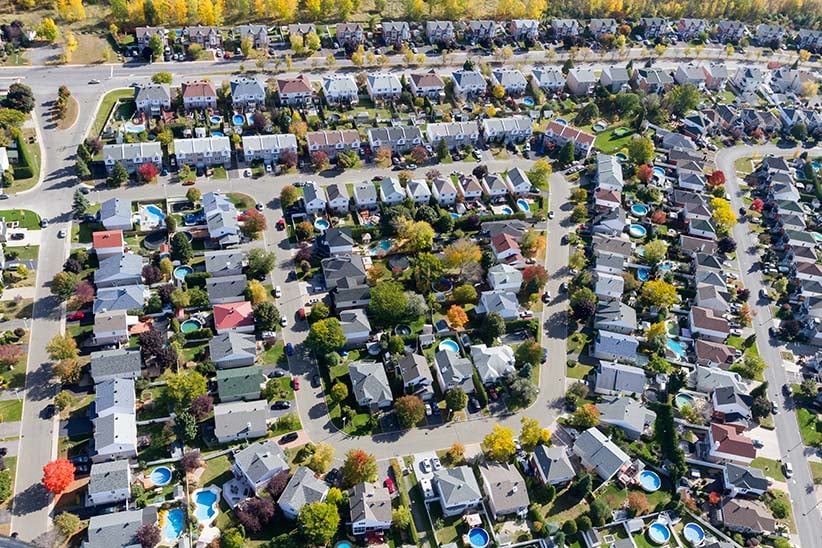Is it okay for a city to track what’s in your poop?
That’s just one of the ethical dilemmas sure to arise as municipalities across Canada rush to embrace smart city initiatives
Aerial view over the Montreal suburb and middle class homes. (FOTOimage/Getty Images)
Share

A smart city, on its face, seems preferable to a dumb city. Communities where technology improves everything from traffic flow and trash collection to snow removal and healthcare services, and where an infrastructure of sensors enables public officials to identify and address emergencies more quickly, are surely better than the status quo. Smart cities are for smart citizens who want better living through technology. But while smart cities have great potential to improve residents’ well-being, there are ethical risks that might encourage us to ease off the smart city accelerator.
The concerns are pressing as numerous Canadian cities are already implementing smart city initiatives. In 2010, Stratford, Ont. deployed a city-wide wireless, smart-metering network to collect data on energy use and provide residents with real-time information about consumption and cost. In Edmonton, officials are close to installing technology that would collect real-time information about the availability parking spots across the city and make the data available to residents through an app and online map. And in Budget 2016, the federal government announced plans to launch a Smart Cities Challenge in 2017, encouraging Canadian cities to “create ambitious plans” to improve urban life by implementing technology in buildings, roads, energy systems, homes and businesses.
At their core, smart cities collect data about residents’ activities and resource-use through networks of sensors, cameras and other tracking technologies. The data are analyzed in real- or near real-time and the results are used to coordinate and deliver public services more efficiently and cost-effectively.
Familiar examples include parking garages equipped with sensors to track vehicles and send data to digital signs and lights indicating where spots are available or whether the garage has reached capacity. Many public transit vehicles are already equipped with tracking technologies to provide information about schedules and delays to users’ GPS-enabled smartphones. More fanciful visions imagine emergency services delivered by drone to individuals whose health-monitoring smartphones flag imminent or occurring medical crises.
Listen to Daniel Munro speak with 1310 News’s Mark Sutcliffe about the ethics of smart cities:
A lesser known, but intriguing, example is sewage epidemiology which involves installing sensors and diagnostic devices in municipal sewer systems to analyze waste water from homes and other buildings. Based on the presence of certain biomarkers, sewer surveillance systems can provide public health officials with early signs of emerging clusters of disease, or alert law enforcement officials about increasing rates of criminal drug use.
So what are the ethical concerns? In the first place, privacy may be threatened by the ubiquity of sensors and the collection and storage of individualized behavioural data. Parking meters that allow for payment by smartphone are convenient, but generate digital records of the movements of individuals. Sewer surveillance can help health officials respond quickly to disease outbreaks, but can also be engineered to track biomarkers of residents’ private consumption patterns. In general, smart cities make it increasingly difficult to move anonymously in public, for better or worse, and even to maintain privacy within one’s own home.
Some smart city initiatives can also exclude groups of people, particularly those without access to the technologies needed to participate and receive services. Public transit information systems that require smartphones marginalize people without them, such as seniors who continue to use old flip-phones. Or consider how public libraries, in an effort to save space, are turning to digital books for e-readers instead. Can’t afford an iPad? No Chicken Soup for the Soul for you.
Perhaps the greatest risks posed by smart cities, however, are threats to democratic accountability and control. With reams of data effectively driving decisions, public officials may feel less compelled to provide reasons for decisions—and citizens may feel less entitled to demand them. When confronted with questions about unpopular policy or program changes, officials might respond by saying that “the data made me do it,” rather than offering accounts for decisions that reasonable citizens could accept as compelling and legitimate.
At the same time, the process through which many smart city initiatives are introduced may be in tension with a democratic ideal of citizens collectively shaping their shared future. Comprehensive smart city plans are sometimes presented and discussed, but initiatives more often emerge incrementally, without fanfare and without immediately revealing the risks they entail. If we dismiss the incremental as insignificant—if we allow our collective futures to be determined by “drift and inadvertence” rather than lively democratic deliberation and informed decision-making, as the philosopher Hanna Pitkin writes—we will end up with communities that look nothing like the smart cities we were promised.
Achieving genuinely smarter cities that make life better for all citizens, while minimizing threats to privacy, inclusion and democracy, requires active and collective discussion of risks. Smart cities could make our lives better, but only when accompanied by smart, ethical reflection and decision-making.
Listen to Dan Munro on The Ethics Lab on Ottawa Today with Mark Sutcliffe, Thursdays at 11 EST. You can follow him on Twitter at @dk_munro.